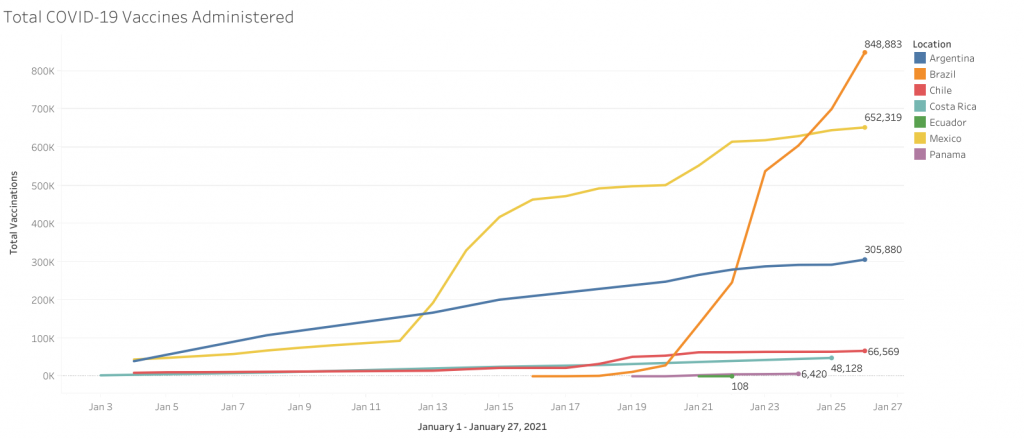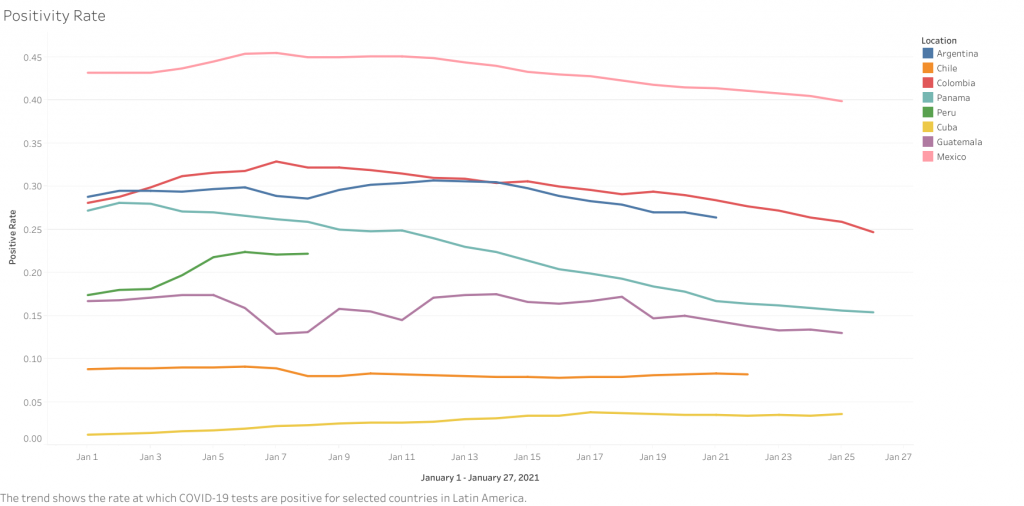What you should know
- Education: By the end of 2020, 87 percent of Latin America and the Caribbean’s 160 million students had been out of in-person school for eight months. These losses in learning could cost the region up to $1.2 trillion in lifetime earnings, according to the World Bank.
- Tourism: The Global Tourism Crisis Committee has called for vaccine passports to jumpstart international tourism. But the Pan American Health Organization (PAHO) said it would not support the proposal believing it would “widen inequalities.” PAHO Deputy Director Dr Sylvain Aldighieri also noted there is little evidence as to whether vaccination reduces the risk of transmission.
- Travel Bans: President Joe Biden imposed travel restrictions on non-US citizens traveling to the United States from the United Kingdom, Ireland, 26 countries in Europe, South Africa, and Brazil to limit the spread of COVID-19 and contain new variants of the disease. On Thursday, the United States announced its first two cases of the South Africa variant.
- Colombia: On January 26, Defense Minister Carlos Holmes Trujillo passed away from COVID-19 complications. A remarkable leader and person, Minister Trujillo was a friend of the Center, and we had the honor of hosting him on multiple occasions. We extend our deepest condolences to the Colombian people and his loved ones.
- 1 Million: The Americas have reported 1 million COVID-19 deaths. Globally there have been 2.13 million deaths recorded.
Health + Innovation
Countries in the region continued to announce new procurement agreements and approvals, although some countries are experiencing delays in shipments of COVID-19 vaccines.
- New Variants: On January 25,Moderna and Pfizer-BioNTech reported their COVID-19 vaccines are effective against new COVID-19 variants discovered in the United Kingdom and South Africa, but offer slightly less protection against the variant in South Africa. Moderna is investigating whether a third dose of its vaccine will better prevent against the South Africa variant and is also testing a new vaccine formula for the same purpose.
- Brazil: On January 23, Brazil began administering 2 million AstraZeneca COVID-19 vaccines made in India. Brazil is awaiting active ingredients from China to produce 100 million doses of the Sinovac and AstraZeneca vaccines domestically, but the shipment from China has been delayed. A first shipment, with supplies for 8.5 million doses of the Sinovac vaccine, is expected to arrive by February 3.
Supreme Court Justice Ricardo Lewandowsky has opened an investigation into Health Minister Eduardo Pazuello’s handling of the COVID-19 pandemic in Manaus. Many of the hospitals in the capital of the Amazonas state ran out of oxygen last week causing forty patients to suffocate.
- Mexico: On January 24, Mexican President Andrés Manuel López Obrador announced he had tested positive for COVID-19 and begun medical treatment for mild symptoms. López Obrador reached a deal with Russian President Vladimir Putin on January 25 for 24 million doses of the Sputnik V vaccine. Also on January 25, the son of Mexican billionaire Carlos Slim tweeted his father tested positive for COVID-19.
- Mexico has only received approximately half of the 1.5 million doses it was supposed to receive from Pfizer by the end of January, due to delivery delays. The delay could be problematic; roughly half a million health workers who received an initial dose will have to wait longer than is ideal for the second dose. Shipments are expected to resume on February 15.
- Costa Rica: President Carlos Alvarado announced that Costa Rica had secured enough vaccines to cover the entire population over the age of 18 (3.7 million people). These include doses purchased through the COVAX mechanism and doses purchased from AstraZeneca and Pfizer-BioNTech. On January 21, Pfizer announced it had suspended vaccine shipments to Costa Rica for three weeks due to production issues. Weekly shipments are expected to resume mid-February.
- COVID Testing Hospitality: On January 26, Hyatt Hotels Corporation announced it will offer free COVID-19 testing at all of its 19 resorts in Latin America and the Caribbean through May 31, 2021. The offer is valid for up to two guests per room at 19 participating resorts in Mexico, Costa Rica, the Caribbean, and South America.
- Mental Health Support: On January 20, PAHO donated eight tablets to The Bahamas’ Ministry of Health and Public Hospital’s Authority to support and strengthen the delivery of mental health and psychosocial support services (MHPSS). PAHO cited natural disasters and the ongoing COVID-19 pandemic as two sources of fear and distress in the population. Telepsychology enables mental health practitioners to reach patients in quarantine.
Economies in focus
International Analysis
- Oxfam International predicts that the mega rich will recover economic losses in as little as nine months, while those living in poverty will need a decade to recover from the impact of the COVID-19 pandemic.
- Reuters reports that fund managers and analysts are watching countries’ vaccine rollout progress to gauge which markets will recover quickest from the COVID-19 economic and health crisis.
Economic Relief
- The IMF reached a staff-level agreement with Costa Rica to provide $1.75 billion over a three-year period to support the government’s policy and reform efforts intended to bolster the country’s COVID-19 response.
- On January 26, the Cayman Islands opened enrollment for a new round of government stipends for the tourism industry. Nearly 3,000 tourism workers have taken advantage of the program thus far.
- The IMF announced that Panama had qualified for a precautionary line of credit to relieve the economic impact of COVID-19.
Economic Impact
- The United States’ requirement to present a negative PCR test to return to the country will likely have an increased impact on Mexico, which has limited capacity to administer COVID-19 tests.
- The Colombian peso performed the worst in 2020 among 31 major currencies tracked by Bloomberg.
Quarantine + Travel Restrictions
Countries across the region have enacted more restrictions amid fears of new COVID-19 variants.
Quarantine and Reopening Plans
- Amazonas, the Brazilian state, issued a one-week stay-in-place order beginning on January 25 as hospitals in the region’s capital, Manaus, face mounting pressure.
- The Cuban government closed schools, public transportation, and cultural activities amid the worst outbreak of COVID-19 on the island since the pandemic began.
- Peru declared a total lockdown in the capital and nine other regions after COVID-19 cases continued to rise. The new measures will remain in place until at least February 14.
- Mexico updated its four-colored traffic light system. San Luis Potosí returned to red, maximum risk. In the last month 5 states have returned to red, bringing the total to 10 out of Mexico’s 32 states.
- On January 25, Chile reinstated strict quarantines in beach and resort areas to prevent a collapse of the healthcare system as tourists flock to the areas.
- Bolivia will reimpose a two-week total quarantine in Santa Cruz, the region most impacted by COVID-19, to prevent an outbreak of the newest COVID-19 strain.
International Travel Restrictions
- International airlines like Dutch airline KLM are expected to suspend their flights from Argentina to Europe in response to the heavy COVID-19 restrictions being implemented across Europe to contain the new COVID-19 variants.
In Focus: Including Migrants in Vaccination Plans
- In December, Colombian President Iván Duque announced that Colombia would vaccinate Venezuelan migrants, although they must have already legalized their migratory status in Colombia. The President warned that if the government announced that they would vaccinate all Venezuelans, Colombia would have been inundated with new migrants. The policy, however, will affect nearly 60 percent of the 1.8 million Venezuelans living in Colombia.
- Similar policies have also been announced in the Dominican Republic and Haiti, where only those with residency papers will be eligible for COVID-19 vaccines. While Ecuador has yet to release its vaccination strategy, an internal document notes that the plan will vaccinate high risk populations and develop a strategy to immunize migrant populations along high-transit borders. In December, the Peruvian Congress approved a law establishing free and voluntary access to preventative and curative treatment for COVID-19 for the country’s inhabitants.
- International organizations like the Red Cross, and UNHCR have called upon international governments to include migrants in their national strategies and warned that the failure to include migrants in vaccination strategies poses a global risk by allowing the virus to remain uncontrolled.
Future of Work
Companies are facing a host of challenges in regard to their most important asset – their people. While workforce transformation is not a new concept for global organizations, the COVID-19 pandemic has forced us to rapidly adapt our standard ways of working and how we engage with employees to ensure the long-term viability of the business.
Join Baker McKenzie for FutureWorks, a virtual webinar series of six conversations with key private-sector leaders on how global employers can embrace the large-scale trends changing the nature of work. The conversations, occurring in February and March, will focus on topics ranging from resilience in the workplace, to psychological wellbeing in pandemic times, to harnessing the power of inclusion, to conceptualizing the idea of place.
By the numbers
- Cases by country: Brazil (8,936,590) #3 worldwide, Colombia (2,041,352) #11 worldwide, Argentina (1,885,210) #12 worldwide, Mexico (1,788,905) #13 worldwide, Peru (1,107,239) #18 worldwide, Chile (709,888) #24 worldwide, Panama (313,834) #41 worldwide, Ecuador (242,146) #46 worldwide, Dominican Republic (207,455) #52 worldwide, Bolivia (205,208) #53 worldwide, Source: worldometers.info
- Prevalence rate (total cases per million people: Panama (72,089) #9 worldwide, Aruba (63,237) #16 worldwide, Brazil (41,873) #34 worldwide, Argentina (41,495) #35 worldwide, Colombia (39,381) #38 worldwide, Costa Rica (37,367) #46 worldwide, Chile (36,954) #48 worldwide, Peru (33,317) #54 worldwide, Saint Martin (29,354) #60 worldwide, Belize (29,343) #61 worldwide, Source: worldometers.info
- Deaths per capita (deaths per million people): Peru (1,207) #17 worldwide, Panama (1,180) #19 worldwide, Mexico (1,172) #20 worldwide, Argentina (1,040) #25 Argentina, Brazil (1,026) #27 worldwide, Colombia (1,018) #28 worldwide, Chile (939) #32 worldwide, Bolivia (859) #34 worldwide, Ecuador (824) #37 worldwide, Source: worldometers.info
Quick take


